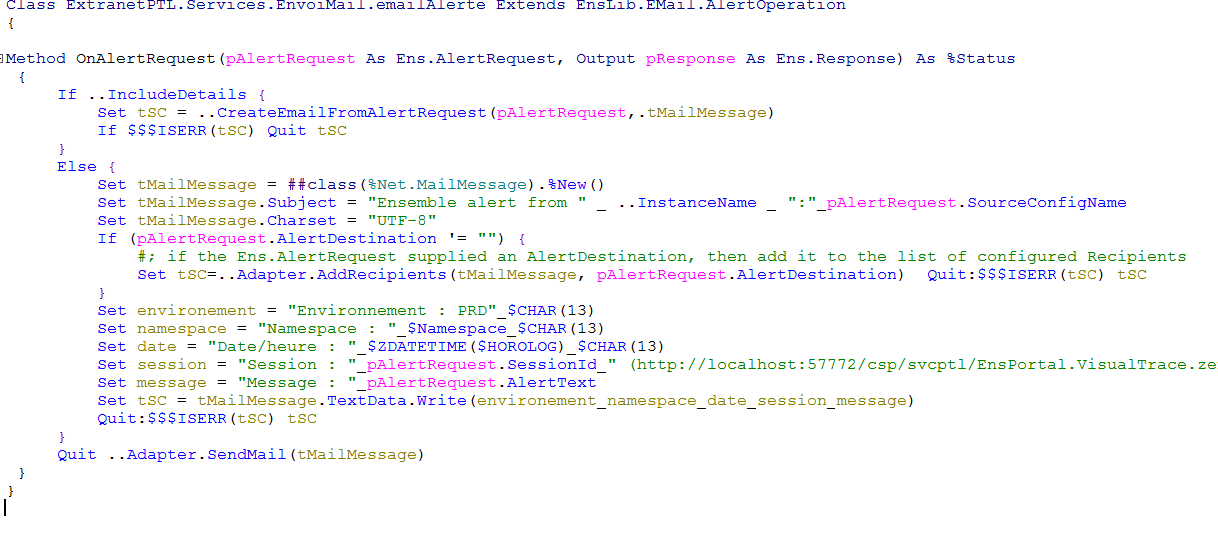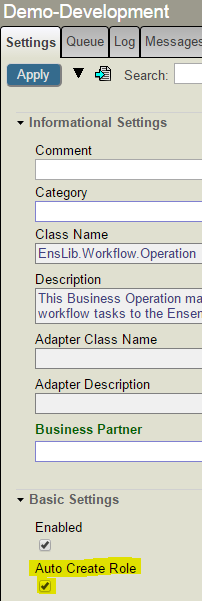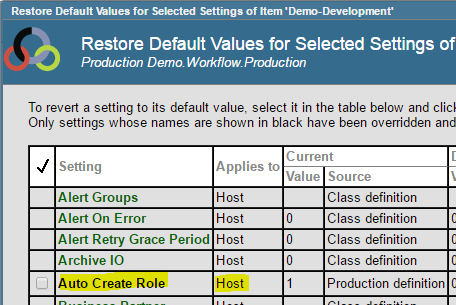I have an Enslib REST web service using an http host. How can it be converted to use https?
InterSystems Ensemble is a complete and easy-to-use integration platform that enables users to connect people, processes, and applications in record
time.
InterSystems Ensemble is a complete and easy-to-use integration platform that enables users to connect people, processes, and applications in record
time.
I have an Enslib REST web service using an http host. How can it be converted to use https?
Hello ,
Ensemble Business Process seems like red color but it still processing message successfully. I have checked log, events, queue everything is clear. there is no log info or error in the history. If BP is in red color in the sense might have some issues, but is still processing messages successfully.
Can you guys please advice on this.
How to achieve load balancing for Ensemble servers? Please explain in details. Thank you very much.
Hello guys,
I have been playing around with the deployment tools from Ensemble (mostly based on this article https://docs.intersystems.com/latest/csp/docbook/DocBook.UI.Page.cls?KE…) , but so far the one thing I still couldn't figure out is how to group files into a single "Studio project file".
By using the deployment tool UI, supposing that I want to add a bunch of custom files to my deployment file (XML), it's practically impossible because I need to add one by one.
So the only way around it is using this idea of grouping files into a "Studio project file" and thereafter adding
Hi All,
I have created custom TCP service and custom TCP Operation in ensemble.
The custom TCP operation sending some data to Cutom TCP service and received ACK from TCP service.
My Custom TCP Opeartion :
Method OnMessage(pRequest As CUSTOM.RECORD, Output pResponse As Ens.StringContainer) As %Status
{
Do ..Adapter.SendMessageString("Testing string",.pResponse)
Set ^RESPONSE=pResponse
Quit $$$OK
}
My Custom TCP Service :
Method OnProcessInput(pInput As Ens.StringContainer, Output pOutput As Ens.StringContainer) As %Status
{
Set ^LOG($NOW())=pInput.StringValue
set
I am working in Ensemble (Health Connect) and doing an HL7 translation
I have what I hope is a simple coding question (but for the life of me, I am struggling). I have a requirement where I need to extract the last 5 characters of a variable length string. The return value should be those last 5 characters. For example - String = CE325ACCT98765 where the return value of the function needs to be 98765. I am just drawing a blank.
thank you,
Gigi
InterSystems products (InterSystems IRIS, Caché and Ensemble) support AIX on Power 9 chips starting with:
Caché/Ensemble 2017.1.3
InterSystems IRIS 2018.1.1
Hello!,
I was wondering if some one have an example code of the MessageBank Helper Class? , im currently using the MessageBank ok to store all message/events, but i need to be able to search for messages using the bodyclass properties.
I've read that using MessageBank Helper Class you can do that, but i just cant find anything , documentation only says use the OnBankMSG() method and thats it.
I have a CSP REST web application where I'm using delegated authentication via basic authentication in the REST calls. When I do a call to the web app with correct user credentials, I get a CSPSESSIONID cookie back representing the CSP session, which has started for the user I'm logged in with.
And when I want to log out/end the CSP session with the "CacheLogout=end" query parameter, I get a 401 Unauthorized code back. But the csp session itself does get terminated, which means the logout call was successful.
Is there a way to have it return a 200 OK status code?
I'm receiving HL7 message containing the escape sequence \X00D\ indicating a carriage return. In the HL7 documentation I find that this is a valid escape sequence but when I read the intersystems documentation it states that only \X0D\ is valid.
What is the best way to work around this? I think that intersystems should change the UnescapeEx method in the EnsLib.HL7.Segment so that it complies with the standards.
InterSystems is pleased to announce the availability of Caché and Ensemble 2017.2.2
There are many corrections in these releases. Please find a full list of the corrections in the release notes.
The version number of the kits is 2017.2.2.865.0.
The list of platforms is the same as for 2017.2.1. For complete platform details please refer to the 2017.2 Supported Platforms document.
HealthShare Health Connect based on Ensemble 2017.2.2 is not yet available, but will be announced soon.
Hi DC,
I'm looking for some creative outside-the-box thinking and gaudiness.
I have a device that send its data in UDP Multicast.
I need to parse this data and send it to an outside SQL table (sql outbound adapter)
I planned on a udp inbound adapter but apparently it is not operable.
Can anyone direct me to a thought on how to grab the data and send it to my future process?
I have thoughts on scripts that capture the data to file and then I will use the file inbound adapter, or maybe in some way, forward the UDP, packet to a TCP one (don’t know if possible) and then use the TCP inbound adapter…
I'm
Hi,
I was wondering if there is any information about the events I can use when using a business service. I am using "OnProcessInput" event to define the logic of my script but I would need to run a different script when finished. I guess it would be easier to understand if I provide more information. My business service just calls a store procedure to receive messages from a database. Once there are no messages received I need to run a different query but I cannot find any option to determine when the last message has been received.
I found OnClose and OnTearDown events...but those are more
I'm trying to add an Operation to store DICOM files but each time I add a Operation using the class EnsLib.DICOM.Operation.TCP it reverts into Services and I cannot work out why this is happening. I've tried following the guide online (link at the bottom) but the Operation still reverts to a Service.
Any pointers would be appreciated,
Thank you.
https://docs.intersystems.com/latest/csp/docbook/DocBook.UI.Page.cls?KE…
I have a service that takes a file and pass it through to the production .While I am passing the file through I get the file stream and set it to a variable within my message and the variable is of type %Ens.StreamContainer. But after all processing and I need to write out my file to a pdf format The file gets written but is a corrupt file since I can not read it I have tried this with asimple pass through everything is fine .But here I do not know what I am doing wrong here is the operation code
set pInput=pRequest.FileStream
;the variable to hold the status for the method
#dimI have a need to restrict some developers access to Message Viewer in a namespace without restricting their ability to create or modify productions components. Is there a way to do this? It's not clear from the documentation.
Hi Everybody!
We are pleased to invite you to the upcoming webinar "Optimizing Application Performance" on 29th of May at 10:00 (Moscow time)!
A unique chance to talk about application performance.
I have a service that takes a file and pass it through to the production .While I am passing the file through I get the file stream and set it to a variable within my message and the variable is of type %Ens.StreamContainer. But after all processing and I need to write out my file to a pdf format The file gets written but is a corrupt file since I can not read it I have tried this with asimple pass through everything is fine .But here I do not know what I am doing wrong here is the operation code
set pInput=pRequest.FileStream
;the variable to hold the status for the method
#dimHello Community :)
I am currently creating some documentation for my team. I need to show every connections between my business process, business services, and operations . All I can have is only one link like this screenshot :
Do you know any way to show every links, or to get a good visual documentation ?
Thank you in advance, have a good day Developers !
Hi
number - @''"
Hello,
I used the operation : EnsLib.EMail.AlertOperation to send mail to handle error. However, I want to get more information about the error (session ID message, the date, the namespace... etc).
what is the best way to do it?
I tried to add informations in OnAlertRequest method as below but I need to change mail operation from all namespaces...

Hi, Community!
I am trying to create a business service that takes a csv through a FTP server and pass it to a business process. So, I have created a registration map for the CSV file and the business service which extends from the EnsLib.RecordMap.Service.FTPService . When I try to configure the business service in the FilePath section I enter the FTP server path and it connects without problems, the problem appears when I assign the ArchivePath path, which is also inside the server.When I do that, I get an error which says that the pathway doesn't exists.
Hello,
I want to convert a json, which passed on in the a REST call, into a request message.
I use method %ConvertJSONToObject of the %ZEN.Auxiliary.altJSONProvider class.
Set sc = ##class(%ZEN.Auxiliary.altJSONProvider).%ConvertJSONToObject(%request.Content, "TestRequest", .request)
Is there an alternative for this? I want to avoid to use the %ZEN library.
Best Regards
Roger de Coninck
Let's say I have a user-generated document template with placeholders and I want to replace them with actual values.
Values could be:
So far I wrote a simple find/replace tool that works with RTF format (because it's not a binary format), here's how it works:
set template = "D:\Cache\RTF\template.rtf"
set var("%title") = "Hello"
set var("%table") = $lb("Utils.RTF", "TestFunc")
set result = "D:\Cache\RTF\out.rtf"
set sc = ##class(Utils.RTF).replace(template, .var, result)There should be two placeholders in RTF template: %title and %table and the are replaced with "Hello" and
Question:
How can I get a value of a setting of a Production item programmatically?
Answer:
You can use one of the API methods of the Ens.Director class, for example:
Ens.Director:GetItemSettingValue()
For example –
In the Production Demo.Workflow.Production the item (Business Operation) 'Demo-Development' has an 'Auto Create Role' setting:

Clicking on the Settings Defaults button you can see this is a 'Host' setting:

And you can access the value using this call for example:
ENSDEMO>write ##class(Ens.Director).GetItemSettingValue("Demo-Development","Host","AutoCreateRole",.status)
1Note the first
I've set up a Ens.Alert routing rule and would like to route alerts to different email groups based on business partner or alert group instead of relying on source config using Document.SourceConfigName. Is there a way to reference the business partner or alert group property in a routing rule?
I have several stored procedures that when I execute them they will only return a single snapshot. In my BP I have been setting this to a Snapshot variable then looping using a WHILE through the snapshot variable just to get that single value.
Since it is only a single row, is there an easier way where I don't have to do a WHILE loop to pull the values out of that row? Can I call First Row or something like that to get me just the row into the Snapshot variable?
Hello,
I want to know if there is any possible way to use the same query for different ODBC schemas.
Thanks.
Hi guys,
is there any way to configure Ensemle Web Service (EnsLib.SOAP.Service ) to accept HTTP Basic authentication instead of SOAP security headers?
Thanks.
Hi,
I want to splice a PID segement returned from a query, so I can use it in a DTL:
<assign value='context.pidSegment' property='target.{PIDgrp.PID}' action='set' />
I need to set the value of 'context.pidSegment' to something I can use in the DTL objectscript expression
but I'm not sure what method (or property) to use to get the class EnsLib.HL7.Segment segment into a datatype that can be used in the DTL?
I've tried the following to no avail;